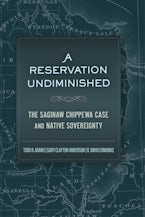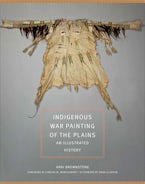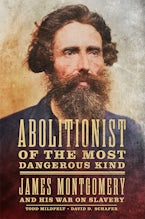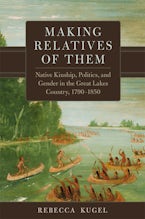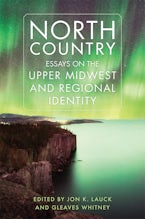HISTORY / United States / State & Local / Midwest (IA, IL, IN, KS, MI, MN, MO, ND, NE, OH, SD, WI)
Showing results 1-10 of 47
Filter Results OPEN +

A Reservation Undiminished
The Saginaw Chippewa Case and Native Sovereignty
Reservation Undiminished presents a cohesive narrative of a legal case that testifies to Native persistence in asserting territorial sovereignty in the twenty-first century—and that highlights the potential for conflict resolution in seemingly intractable legal struggles between state, local, and tribal governments.
Between the Floods
A History of the Arikaras
Enhanced with the insights of archaeology, linguistics, and anthropology, and illustrated with Native maps and ledger art, as well as historic photographs and drawings, Between the Floods brings unprecedented depth, detail, and authenticity to its picture of the Arikaras in the fullness and living presence of their history.
Damming the Reservation
Tribal Sovereignty and Activism at Fort Berthold
In Damming the Reservation, Angela K. Parker, an enrolled member of the Three Affiliated Tribes, offers a deeply researched, unflinching history of the tribes’ fight to preserve and rebuild their culture, shared history, common stories, sense of place, and sovereignty in the face of what Vine Deloria Jr. called “the single most destructive act ever perpetrated on any tribe by the United States.”
Indigenous War Painting of the Plains
An Illustrated History
Offering first-time vivid access to the key works of war painting preserved in 37 museums throughout North America and Europe, Indigenous War Painting of the Plains illuminates distinctions between painting styles of different tribes, reveals how they influenced each other and changed over time, and, finally, conveys a deep understanding of how war painting developed in relation to profound social changes in Plains Indian cultures.
Killing over Land
Murder and Diplomacy on the Early American Frontier
Ultimately, what Owens analyzes in Killing over Land is nothing less than the commodification of human life in return for a sense of order—as defined and accepted, however differently, by both Native and white authorities as the contest for land and resources intensified in the European colonization of North America.
Abolitionist of the Most Dangerous Kind
James Montgomery and His War on Slavery
A controversial character largely known (as depicted in the movie Glory) as a Union colonel who led Black soldiers in the Civil War, James Montgomery (1814–71) waged a far more personal and radical war against slavery than popular history suggests. It is the true story of this militant abolitionist that Todd Mildfelt and David D. Schafer tell in Abolitionist of the Most Dangerous Kind, summoning a life fiercely lived in struggle against the expansion of slavery into the West and during the Civil War.
Making Relatives of Them
Native Kinship, Politics, and Gender in the Great Lakes Country, 1790–1850
A deeply researched, finely observed work by a respected historian, Making Relatives of Them offers a nuanced perspective on the social and political worlds of the Great Lakes Native peoples, and a new understanding of those worlds in relation to those of the European colonizers and their descendants.
North Country
Essays on the Upper Midwest and Regional Identity
From the fur trade to tourism, fisheries to supper clubs, Finnish settlers to Native treaty rights, the nature of the North Country emerges here in all its variety and particularity: as clearly distinct from the greater Midwest as it is part of the American heartland.
The Good Country
A History of the American Midwest, 1800–1900
At the center of American history is a hole—a gap where some scholars’ indifference or disdain have too long stood in for the true story of the American Midwest. A first-ever chronicle of the Midwest’s formative century, The Good Country restores this American heartland to its central place in the nation’s history.
Chief Thunderwater
An Unexpected Indian in Unexpected Places
Self-promoter, political activist, entrepreneur: Reid’s critical study reveals Thunderwater in all his contradictions and complexity—a complicated man whose story expands our understanding of Native life in the early modern era, and whose movement represents a key moment in the development of modern Haudenosaunee nationalism.

A Reservation Undiminished
The Saginaw Chippewa Case and Native Sovereignty
Reservation Undiminished presents a cohesive narrative of a legal case that testifies to Native persistence in asserting territorial sovereignty in the twenty-first century—and that highlights the potential for conflict resolution in seemingly intractable legal struggles between state, local, and tribal governments.
Between the Floods
A History of the Arikaras
Enhanced with the insights of archaeology, linguistics, and anthropology, and illustrated with Native maps and ledger art, as well as historic photographs and drawings, Between the Floods brings unprecedented depth, detail, and authenticity to its picture of the Arikaras in the fullness and living presence of their history.
Damming the Reservation
Tribal Sovereignty and Activism at Fort Berthold
In Damming the Reservation, Angela K. Parker, an enrolled member of the Three Affiliated Tribes, offers a deeply researched, unflinching history of the tribes’ fight to preserve and rebuild their culture, shared history, common stories, sense of place, and sovereignty in the face of what Vine Deloria Jr. called “the single most destructive act ever perpetrated on any tribe by the United States.”
Indigenous War Painting of the Plains
An Illustrated History
Offering first-time vivid access to the key works of war painting preserved in 37 museums throughout North America and Europe, Indigenous War Painting of the Plains illuminates distinctions between painting styles of different tribes, reveals how they influenced each other and changed over time, and, finally, conveys a deep understanding of how war painting developed in relation to profound social changes in Plains Indian cultures.
Killing over Land
Murder and Diplomacy on the Early American Frontier
Ultimately, what Owens analyzes in Killing over Land is nothing less than the commodification of human life in return for a sense of order—as defined and accepted, however differently, by both Native and white authorities as the contest for land and resources intensified in the European colonization of North America.
Abolitionist of the Most Dangerous Kind
James Montgomery and His War on Slavery
A controversial character largely known (as depicted in the movie Glory) as a Union colonel who led Black soldiers in the Civil War, James Montgomery (1814–71) waged a far more personal and radical war against slavery than popular history suggests. It is the true story of this militant abolitionist that Todd Mildfelt and David D. Schafer tell in Abolitionist of the Most Dangerous Kind, summoning a life fiercely lived in struggle against the expansion of slavery into the West and during the Civil War.
Making Relatives of Them
Native Kinship, Politics, and Gender in the Great Lakes Country, 1790–1850
A deeply researched, finely observed work by a respected historian, Making Relatives of Them offers a nuanced perspective on the social and political worlds of the Great Lakes Native peoples, and a new understanding of those worlds in relation to those of the European colonizers and their descendants.
North Country
Essays on the Upper Midwest and Regional Identity
From the fur trade to tourism, fisheries to supper clubs, Finnish settlers to Native treaty rights, the nature of the North Country emerges here in all its variety and particularity: as clearly distinct from the greater Midwest as it is part of the American heartland.
The Good Country
A History of the American Midwest, 1800–1900
At the center of American history is a hole—a gap where some scholars’ indifference or disdain have too long stood in for the true story of the American Midwest. A first-ever chronicle of the Midwest’s formative century, The Good Country restores this American heartland to its central place in the nation’s history.
Chief Thunderwater
An Unexpected Indian in Unexpected Places
Self-promoter, political activist, entrepreneur: Reid’s critical study reveals Thunderwater in all his contradictions and complexity—a complicated man whose story expands our understanding of Native life in the early modern era, and whose movement represents a key moment in the development of modern Haudenosaunee nationalism.

